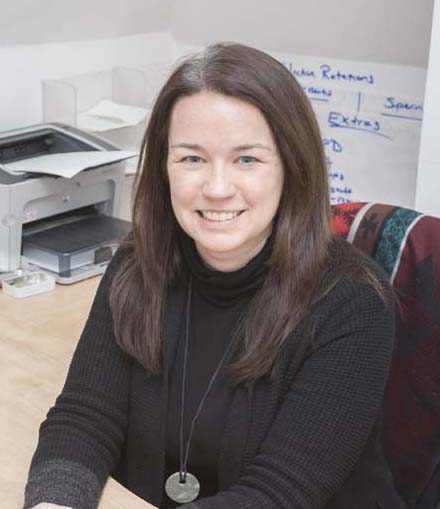BS, St. Lawrence University. MS, Sarah Lawrence College. Course director, thesis advisor, and formerly director of clinical training at Sarah Lawrence College, she is also on the faculty of New York Medical College where she is involved in the Leadership Education in Neurodevelopmental and Related Disabilities (LEND) program. After completing her MS in human genetics from Sarah Lawrence College, she worked as a clinical supervisor certified genetic counselor for New York University Langone Medical Center/Bellevue Hospital. SLC, 2011-
Graduate Courses 2024-2025
MS Human Genetics
Case Management Practicum
Graduate Seminar—Spring
The Case Management Practicum utilizes a standardized patient model to provide students the opportunity to demonstrate and assess their skill levels in competencies necessary for the practice of genetic counseling. Students participate in prepared role-playing exercises, followed by class discussion and feedback. The course structure allows students to demonstrate competence in key skills; assess their own strengths and weaknesses and those of their peers; and formulate a plan for addressing areas needing improvement.
Faculty
Introduction to Disability Studies
Graduate Seminar—Fall
7323
This course and practicum broadly covers contemporary topics of disability. Through guest speakers, panels, and internships, students gain an understanding of the impact of disability, improved communication skills with individuals, families, and service providers, and an increased awareness of the contributions that genetic counseling can make to persons with and without disabilities.
Faculty
Previous Courses
MS Human Genetics
Capstone Project
Graduate Seminar—Year
Every student in the Joan H. Marks Human Genetics Program is required to complete a capstone experience and submit a manuscript documenting the experience or project to fulfill the requirements for obtaining a master’s degree in Human Genetics from the Graduate Studies division of Sarah Lawrence College.
Faculty
- Sara Gilvary
- Anne Greb
- Laura Hercher
Case Management Practicum
Graduate Seminar—Spring
The Case Management Practicum utilizes a standardized patient model to provide students the opportunity to demonstrate and assess their skill levels in competencies necessary for the practice of genetic counseling. Students participate in prepared role-playing exercises, followed by class discussion and feedback. The course structure allows students to demonstrate competence in key skills; assess their own strengths and weaknesses and those of their peers; and formulate a plan for addressing areas needing improvement.
Faculty
Disability Service Learning
Graduate Seminar—Fall
The Disability Service Learning course and practicum broadly covers contemporary topics of disability. Through guest speakers, panels, and internships, students gain an understanding of the impact of disability; improved communication skills with individuals, families, and service providers; and an increased awareness of the contributions that genetic counseling can make to persons with or without disabilities.
Faculty
Disability Studies
Graduate Seminar—Fall
The Disability Studies course broadly covers contemporary topics of disability. Through guest speakers, panels, and experiential activities, students gain an understanding of the impact of disability; improved communication skills with individuals, families, and service providers; and an increased awareness of the contributions that genetic counseling can make to persons with and without disabilities.
Faculty
Fundamentals of Genetic Counseling I
Graduate Seminar—Fall
Fundamentals of Genetic Counseling aims to introduce students to fundamental skills necessary for genetic counseling. The course is structured around key components of a genetic counseling encounter. Readings provide foundational knowledge of relevant concepts and class discussions encourage comparison of different perspectives and applications. Course instructors demonstrate each skill and students then engage in skill development through role-play, peer feedback, and self-assessment.
Faculty
- Claire Davis
- Sara Gilvary
- Janelle Villiers
Introduction to Disability Studies
Graduate Seminar—Fall
This course and practicum broadly covers contemporary topics of disability. Through guest speakers, panels, and internships, students gain an understanding of the impact of disability, improved communication skills with individuals, families, and service providers, and an increased awareness of the contributions that genetic counseling can make to persons with and without disabilities.
Faculty
Professional Issues in Genetic Counseling I - Graduate
Seminar—Spring
The focus of this two part course is to help students develop a professional identity as a genetic counselor in the context of both the healthcare setting and the community as a whole. Topics presented Part I may include resume/cover letter writing, interviewing, summer rotation preparation, performance evaluation and the supervisory relationship.
Faculty
- Sara Gilvary
- Anne Greb
Professional Issues in Genetic Counseling II
Graduate Seminar—Fall
The focus of this two part course is to help students develop a professional identity as a genetic counselor in the context of both the healthcare setting and the community as a whole. Topics presented in Part II of this course may include networking, salary negotiation strategies, billing and reimbursement, licensure, marketing, grant writing, self-care, exam preparation, supervision models and expanded career roles.
Faculty
- Sara Gilvary
- Anne Greb
